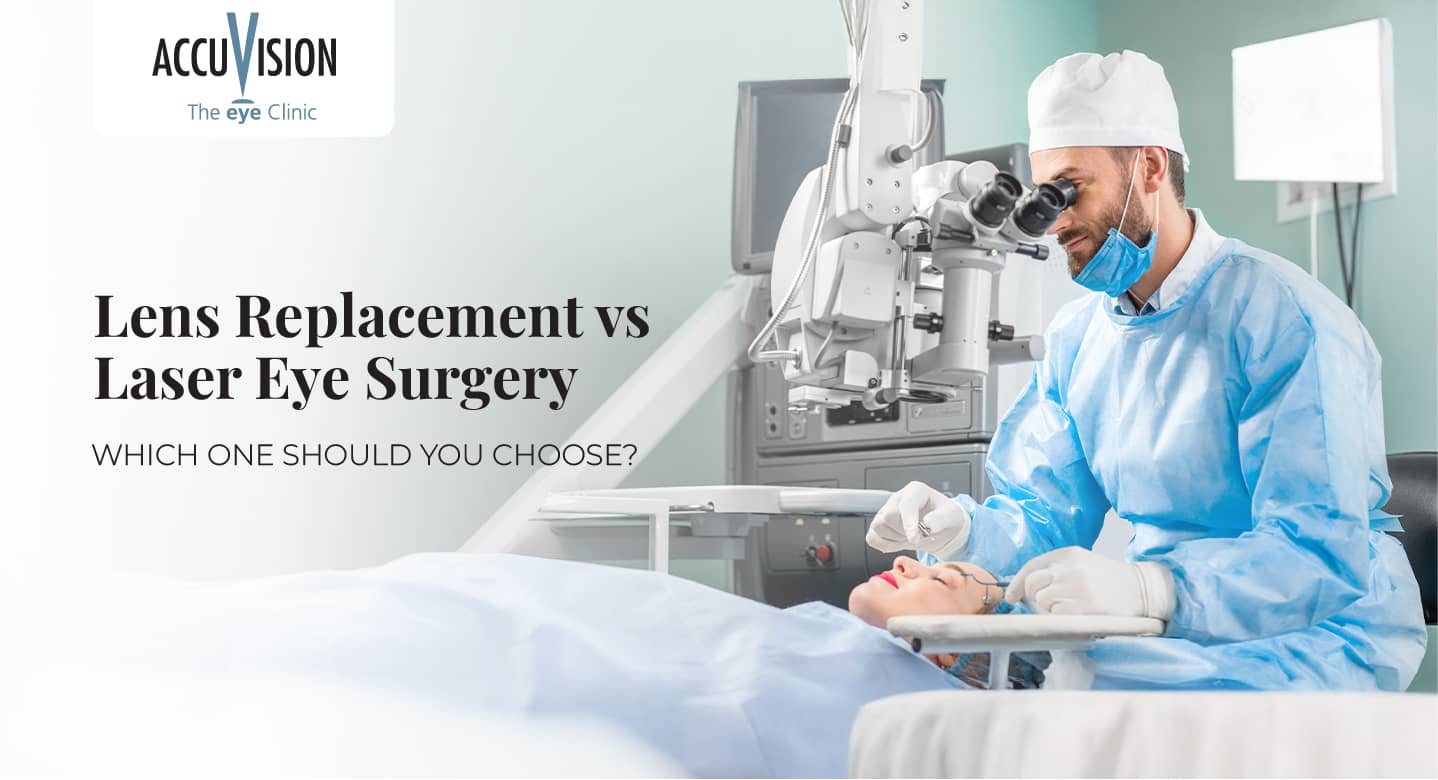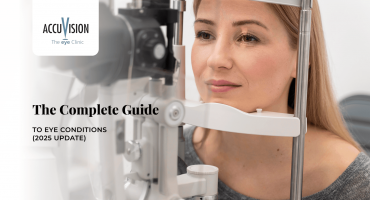- What Is Laser Eye Surgery?
- What Is Lens Replacement Surgery?
- Lens Replacement vs Laser Eye Surgery: Key Differences
- Who Is Each Procedure Best For?
- Safety and Effectiveness: What Patients Should Know
- Recovery and Aftercare Compared
- Laser Eye Surgery vs Lens Replacement: Which One Should You Choose?
- Frequently Asked Questions:
Lens Replacement vs Laser Eye Surgery: Which One Should You Choose?

If you’re one of the millions of people in the UK who rely on glasses or contact lenses, you’ve probably wondered about other options. Modern vision correction has opened up a world of possibilities, offering life-changing surgical solutions that can significantly reduce, or even eliminate, your need for visual aids.
Two of the most advanced and widely considered procedures are laser eye surgery and lens replacement surgery, each working in fundamentally different ways. The right choice for you depends on several factors, including your age, prescription, overall eye health, and daily lifestyle. This comprehensive guide will help you navigate the key differences, benefits, and considerations for both procedures, ensuring you’re well-informed before making this important decision about your vision.
What Is Laser Eye Surgery?
Laser eye surgery encompasses several sophisticated procedures that reshape the cornea to correct refractive errors. The most common techniques available in the UK include:
- LASIK (Laser-Assisted In Situ Keratomileusis): Creates a thin flap in the cornea, reshapes the underlying tissue with laser precision, then replaces the flap
- LASEK/PRK (Photorefractive Keratectomy): Removes the surface layer of the cornea before laser reshaping, ideal for patients with thinner corneas
- SMILE (Small Incision Lenticule Extraction): Uses a femtosecond laser to create a small lens-shaped piece of tissue that’s removed through a tiny incision
These procedures typically suit patients aged 18 – 60 (and sometimes beyond), with stable eye profile, healthy corneas and eyes, and adequate corneal thickness. Laser eye surgery effectively treats myopia (short-sightedness), hyperopia (long-sightedness), astigmatism and presbyopia (age related reading glasses) offering quick recovery times and excellent visual outcomes for suitable candidates.
What Is Lens Replacement Surgery?
Lens replacement surgery, also known as refractive lens exchange (RLE) or clear lens extraction (CLE), involves replacing the eye’s natural lens with an artificial intraocular lens (IOL). This procedure is essentially identical to cataract surgery but can in appropriate cases be performed on clear lenses for refractive prescription correction purposes.
The key distinction from cataract surgery lies in timing and indication: lens replacement surgery addresses refractive errors and presbyopia before cataracts develop, while cataract surgery treats already clouded lenses. This approach may be beneficial for patients over 45 who are beginning to experience presbyopia (difficulty focusing on near objects) or those with very high or complex prescriptions and found unsuitable for laser correction.
The procedure typically appeals to an older age group because it can simultaneously correct distance vision and presbyopia while preempting any future cataract development, as the natural lens is replaced.
Lens Replacement vs Laser Eye Surgery: Key Differences
Understanding the fundamental differences between these approaches helps patients make informed decisions based on their unique circumstances.
| Factor | Laser Eye Surgery | Lens Replacement Surgery |
|---|---|---|
| Typical Age Group | 18 to 60+ years | 40 to 60+ years |
| Procedure Method | Corneal reshaping | Lens replacement |
| Presbyopia Correction | With blended vision | With blended vision or multifocal lenses |
| High Prescription Suitability | Moderate-high, with corneal assessment | Very high prescriptions |
| Recovery Time | 24-48 hours | 1-2 weeks |
| Long-term Changes | Corneal shape reprofiled, natural eye health related changes will continue over the years | Natural lens permanently replaced, natural eye health related changes will continue over the years |
This comparison highlights that neither procedure is inherently superior, they serve different patient populations with distinct needs and circumstances. Having access to technologies and surgical experience with both types of treatment is crucial in
Who Is Each Procedure Best For?
Laser Eye Surgery
For younger patients, laser eye surgery often represents the optimal choice for vision correction. The procedure works exceptionally well for individuals with:
- Healthy corneas with adequate tissue thickness
- Suitable eye anatomy for corneal reshaping
- Active lifestyles where glasses or contact lenses are inconvenient
Comprehensive pre-operative assessments determine suitability, considering factors like corneal shape, thickness, prescription strength, and overall eye health. Ethical practice demands thorough evaluation rather than promises of universal suitability.
Lens Replacement Surgery: A Clinically Considered Approach
At AccuVision, lens replacement surgery, also known as Refractive Lens Exchange (RLE), is offered only when clinically appropriate. This includes patients with:
- Very high prescriptions that cannot be safely corrected with laser surgery.
- Early lens changes that may progress to cataracts.
- Need for comprehensive vision correction at all distances.
Lens replacement surgery involves removing the natural lens and replacing it with a customised intraocular lens (IOL). This procedure is suitable for patients where corneal procedures may not achieve optimal results.
We carefully assess each case to determine the most appropriate treatment, focusing on achieving the best vision outcomes with the least risk. In many situations, corneal procedures like laser eye surgery can deliver similar spectacle independence while being less invasive. Our approach prioritises patient safety, personalised assessment, and clinically justified recommendations.
Safety and Effectiveness: What Patients Should Know
Both laser eye surgery and lens replacement surgery have excellent safety records. It is important to consider the importance of patient centred approaches, with a team like that at AccuVision where surgeons have decades of experience in laser and lens procedures, and access to technology platforms that allow the broadest range of corrections safely.
It is important to remember however, that no surgical procedure is entirely risk-free.
Laser eye surgery risks:
- Complications are rare. When they do occur, if identified and managed appropriately, their impact on the final outcome is minimised
- Temporary dry eyes or light sensitivity may occur.
- In exceptional cases, vision irregularities can happen.
Individual risk profiles can vary from patient to patient based on their eye and medical history. Some patients may have a higher risk of post operative dryness than others, for example. It is important that every pre and post operative care plan considers individual customisation of the whole journey, to help mitigate risks and ensure a smooth recovery back to normal routine.
Despite these risks, the vast majority of patients achieve excellent results with minimal complications.
Lens replacement surgery risks:
- Slightly different from laser surgery, procedures that involve operating inside the eye (intra-ocular) always carry more risk, and higher potential to negatively impact long term vision.
- Potential risks include infection, retinal detachment, or complications with the intraocular lens (IOL).
The success of either procedure relies heavily on a thorough pre-operative assessment, careful selection of suitable candidates, and strict adherence to post-operative care instructions. Patients should always discuss their individual risk factors and expected outcomes during a comprehensive consultation to ensure they make an informed decision.
Recovery and Aftercare Compared
Recovery experiences differ significantly between these procedures, influencing patient planning and expectations.
Laser eye surgery
- Rapid visual recovery, with most patients resuming normal activities within 24–48 hours.
- Initial healing occurs quickly, but complete stabilisation may take several weeks (although not interfering with return to routine).
- There is usually minimal discomfort.
- Patients can return to work promptly.
- Temporary restrictions may apply for swimming, contact sports, and eye makeup.
Lens replacement surgery
- Recovery typically takes 1–2 weeks per eye.
- Procedures are usually performed separately to allow one eye to heal before treating the second.
- Initial recovery is longer than laser eye surgery.
- Patients often experience dramatic visual improvements once healing is complete.
Lens Replacement Cost vs Laser Eye Surgery Cost in the UK
Understanding the financial investment helps patients make informed decisions, though cost should never be the primary determining factor for treatment choice.
Current UK pricing typically ranges:
- Laser eye surgery: £1,500-£3,000 per eye
- Lens replacement surgery: £3,000-£5,000 per eye
The lens replacement cost reflects the complexity of intraocular surgery, sophisticated lens technology, and comprehensive aftercare requirements. Factors influencing pricing include:
- Technology sophistication
- Surgeon experience
- Clinic location and facilities
- Lens type selection (monofocal, multifocal, or toric designs)
- Included aftercare and enhancement policies
Patients should prioritise safety, surgeon expertise, and treatment suitability over cost considerations. The cheapest option may not provide the best value or outcomes for your specific needs.
Laser Eye Surgery vs Lens Replacement: Which One Should You Choose?
The decision between these procedures requires careful consideration of multiple factors rather than a one-size-fits-all approach. Rather than it being a patient preference, the decision should be based on clinical findings and the best decision for individual eyes both in the short term and long term. Key decision drivers include:
- Age and Presbyopia: Younger patients typically benefit more from laser correction, while those over 45 may prefer lens replacement’s presbyopia correction.
- Prescription Strength: Very high prescriptions may exceed laser surgery limitations, making lens replacement more suitable.
- Lifestyle Considerations: Professional requirements, sports participation, and visual demands influence optimal procedure selection.
- Long-term Planning: Patients approaching presbyopia age might prefer lens replacement’s comprehensive solution over potential future procedures.
- Medical History: Existing eye conditions, family history, and overall health affect suitability for each procedure.
Rather than attempting self-diagnosis, booking a comprehensive consultation with an experienced UK eye specialist provides personalised recommendations based on detailed examination and lifestyle assessment.
Final Thoughts
Both laser eye surgery and lens replacement surgery are safe, effective, and potentially life-changing when chosen appropriately. The key is selecting the treatment best suited to your age, prescription, eye health, lifestyle, and personal vision needs. We strongly encourage scheduling a consultation with an experienced UK eye specialist, who can provide tailored recommendations based on a thorough examination to ensure you achieve your vision correction goals safely and effectively.
Frequently Asked Questions:
1. Who is a suitable candidate for laser eye surgery?
Laser eye surgery is typically recommended for patients aged 18 and over with a stable eye profile, healthy corneas, and no underlying eye conditions. A thorough pre-operative assessment is essential to determine eligibility and ensure safe, effective outcomes.
2. At what age should I consider lens replacement surgery?
Lens replacement surgery can be considered in patients over 40, especially those with complex prescriptions or early lens changes. It is also recommended for individuals with high prescriptions unsuitable for laser eye surgery.
3. How long is the recovery period for each procedure?
Laser eye surgery usually allows most patients to resume normal activities within 24–48 hours, lens replacement surgery requires a longer recovery, typically 1–2 weeks per eye, and procedures are often performed on each eye separately.
4. Are the results of laser eye surgery and lens replacement permanent?
Laser eye surgery permanently reshapes the cornea, while lens replacement surgery permanently replaces the natural lens with an artificial intraocular lens (IOL). Both procedures provide long-term vision correction, but age-related changes may still occur in the natural eye over time.
5. What is the cost difference between laser eye surgery and lens replacement surgery in the UK?
In the UK, laser eye surgery generally costs between £1,500–£3,000 per eye, while lens replacement surgery ranges from £3,000–£5,000 per eye. Prices vary depending on lens type, technology, surgeon experience, and clinic facilities, and should not be the sole factor in choosing a procedure.








